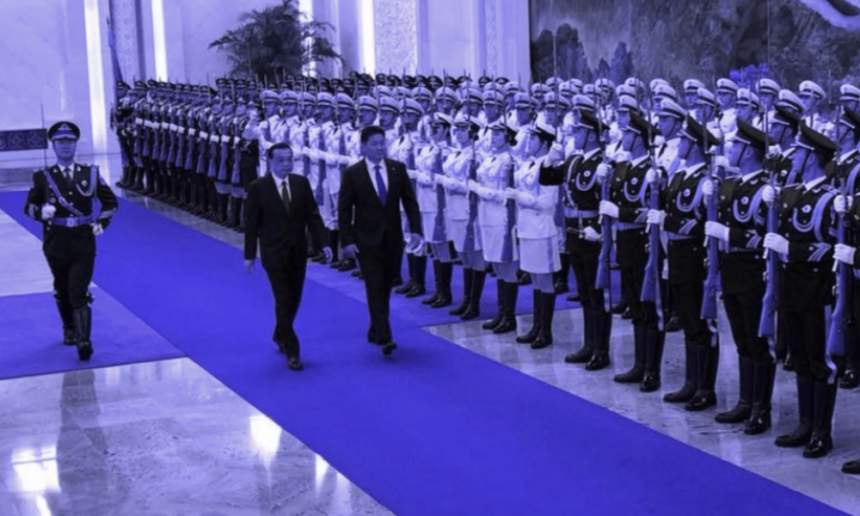Boao is a town located to the southeast of Hainan Island in the South China Sea. Forty years ago when Deng Xiaoping started the ‘open door’ economic policy, Boao was only a remote fishing village. Xi Jinping visited this village with his father when he was a child. This time it was a different situation as he visited the town as Chinese President last week and announced his significant economic reforms in his opening remarks at the Boao Forum for Asia.
Prime Minister of Mongolia U. Khurelsukh also attended the opening ceremony and gave a speech. Then he paid an official visit to the People’s Republic of China (PRC) at the invitation of Li Keqiang, Premier of the State Council of PRC, and also attended the Mongolia-China Business Forum that took place in Beijing.
The Empire
A month ago China made an amendment to its constitution that removed the limits on presidential terms. Before then one presidential term lasted for five years, and a president could be re-elected only once. Now that the change is made, Xi is positioned to lead the country for the second-longest period after Mao.
The new constitution reflects the ideologies of Chinese socialism in the new era, and incorporates a ‘National Supervisory Commission’ to fight corruption. The constitution also has a revamped ideology to ‘build a community with a shared future for humanity’.
The Boao Forum, which is basically the Asian version of the World Economic Forum organized in Davos, has been organized on an annual basis starting from 2002. This year the forum had the theme ‘An Open and Innovative Asia for a World of Greater Prosperity.’ It was announced during the forum that Hainan province will be developed as a free trade port.
President Xi used the opportunity to review the results of China’s ‘open door’ policy of 40 years. Within the time period, their economy has seen an annual growth of 9.5 per cent on average, and China has transformed into the second biggest economy in the world, the largest manufacturing country, and the nation with the biggest trade turnover and largest foreign-exchange reserves. As a result of successfully building a Chinese socialism with a socialist market economy, China rescued 700 million of their people from poverty. Going forward, the nation sets its eyes on prioritizing people-centered development, building a supply-based economy, eradicating poverty, and ensuring social parity.
President Xi listed several objectives in developing their economy and making it more open: 1) open their market wider, free financial services, and increase foreign ownership in banking and insurance organizations, 2) create a better environment to attract foreign investment and review their foreign capital embargo list, 3) improve protection of intellectual property, and 4) further increase imports based on increased domestic demand. In addition to the fourth point, it was announced that seeing a positive balance in foreign trade is not the objective, so China will reduce import tariffs on cars for example.
Furthermore, President Xi stated that China established cooperation agreements with 80 countires in the framework of the Belt and Road project, and emphasized that it is not a geopolitical move but a strong platform for collaboration with neighboring countries.
Business
When President Xi paid an official visit to Mongolia in 2014, China and Mongolia presented an objective to increase their bilateral trade turnover to 10 billion USD by 2020. This time, during Prime Minister U. Khurelsukh’s visit to China, both countries noted the wide range of opportunities to strengthen bilateral trade and economic partnership, stressing that the goal remains to bring trade turnover to 10 billion USD.
With the presence of leaders of both governments, specialist ministers from both sides signed the following documents during the visit: 1) A General Agreement on strengthening production capacity and investment cooperation between the two countries, 2) A Memorandum of Understanding on developing neighboring regions along Mongolia-China border, 3) An agreement on economic aid worth 2 billion CNY to be provided by Chiina, 4) A Memorandum of Understanding on building a new waste water treatment plant for Ulaanbaatar, 5) An agreement on modernization of Erdenet Thermal Power Plant, 6) A Memorandum of Understanding on cooperation in small and medium enterprises, 7) A Memorandum of Understanding on combating smuggling, 8) A 2018-2021 plan on educational exchange and cooperation, 9) A Memorandum of Understanding on cooperation in sports, 10) A Letter of Exchange on ‘Development Center for Disabled Children’ project, and 11) A project on improving the utilization rate of the Buyant-Ukhaa Sports Palace.
In summary, Mongolia and China had a combined total of 600 representatives attending the Boao business forum, and signed 12 agreements and 14 Memorandums of Understanding worth 4.6 billion USD. For example, Bodi International LLC signed a USD 450 million agreement on the Buuruljuut Thermal Power Plant project with the China State Construction Engineering company. Other agreements included a 100-megawatt power plant project in Telmen soum of Zavkhan aimag, opening a 300 million USD loan line between Bogd Bank and an Inner Mongolian bank, and building a waste recycling plant in Ulaanbaatar.
Large projects often require cooperation with Chinese state-owned companies. Such projects always get postponed because Mongolia replaces its government far too often and changes its mind easily. China is usually more interested in having an EPC (equipment, procurement, construction) role in the building stage and then handing over the keys upon completion. In such cases, Mongolia needs to take an active role for the whole duration to learn the know-how, learn the CCR (central control room) software, obtain the right to ownership, and include a third country in arbitration clauses.
The Economist said in its 3 March 2018 edition that “…China is not a market economy… it increasingly controls business as an arm of state power… Though people’s personal lives remain relatively free, he [President Xi] is creating a surveillance state to monitor discontent and deviance… In reality, Mr Xi has steered politics and economics towards repression, state control and confrontation…”.
2018.04.19
Trans. by B.Amar












